Transplant Recipients Banding Together to Help Others
DALLAS — Grady Dozier became a member of a select group five years ago when his disease-riddled, 45-year-old heart was replaced with that of a 23-year-old.
Since then, the Dallas real estate developer has found that a special bond exists among organ transplant patients, who normally might be worlds apart culturally, socially or economically.
“There is a camaraderie among transplant patients that is rather unique,” Dozier said. “It is a continuing thing. It begins before surgery and continues virtually forever. I don’t think anyone (else) truly understands how transplant patients live on the edge.”
The special problems that organ transplant patients have and the need to share them with people who can identify with the adjustments they cause led Dozier and others like him to form the North Texas Heartbeat Assn.
Since it began in May, the organization’s membership has grown to about 55 organ transplant patients and two dozen associated health care professionals involved in transplant procedures. It is one of several such support groups in Texas.
North Texas Heartbeat is dedicated to making the public aware of the need for organ donations, as well as providing support and encouragement for transplant patients and their families.
“Nearly all the transplant patients I have talked to since I had my transplant five years ago have a need to sort of come back and throw the lifeline to others who have to go through what they went through,” Dozier said.
Patients Apart
One of the things that sets transplant recipients apart from other chronically ill patients is their constant fear of infection, Dozier said. Drugs needed to keep the body from rejecting the new organ suppress the immune system, leaving them vulnerable to even the most innocuous infectious diseases.
“I had a friend who came down with the flu and that developed into pneumonia. In order to treat his pneumonia, the doctors had to reduce the immunosuppressive drugs. When they did, he went into rejection and died,” Dozier said.
Promoting donor awareness is a personal experience for many of the group, particularly since statistics indicate that one candidate in three for either heart or liver transplants dies before a suitable organ becomes available.
“I witnessed several patients who did not make it. They did not find a donor in time. I watched them pass away,” Dozier said. “We have a unique identification with that. We’re the lucky ones.”
Dozier is one of the many transplant recipients called on from time to time to visit with prospective patients waiting for a suitable matching organ. He recalled the encouragement they provided when he was awaiting his heart transplant at the University of Arizona Health Science Center in Tucson.
“It helped me that I could see that it worked to see a live, healthy breathing person walking around,” he said.
The group also recognizes that transplant patients have special problems long after their bodies have healed. Most can recount traumatic horror stories of families who do not have the $600 to $1,000 a month needed for essential anti-rejection drugs.
Dozier said neither insurance nor hospital research programs cover numerous post-surgery expenses--items that can be as basic as paying the rent or putting food on the table.
“There are patients who have literally had to walk miles for a checkup because they don’t have money for taxi fare. There are patients who can get there for a checkup but don’t have the money to get home,” he said.
The North Texas Heartbeat Assn. has set up a fund to help transplant patients meet unexpected expenses and hopes to hold a major fund-raiser early this year, Dozier said.
Living Advertisement
Dozier is a good advertisement for heart transplantation; his recovery exceeded all the doctors’ expectations. He was conducting business by telephone within a week of his transplant. He also was able to return to his home in Dallas only six weeks after surgery instead of the usual six-month stay required of most Tucson heart transplant patients.
Dozier said his recovery was aided in part by coping with the myriad metabolic changes that accompany transplantation surgery.
“I just learned early to play a game with myself and pretend this was the way it was from the day I was born,” he said.
More to Read
Sign up for Essential California
The most important California stories and recommendations in your inbox every morning.
You may occasionally receive promotional content from the Los Angeles Times.







